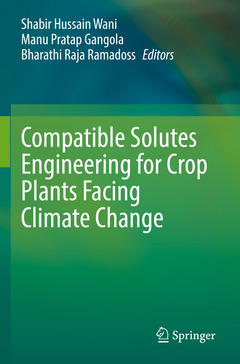Compatible Solutes Engineering for Crop Plants Facing Climate Change, 1st ed. 2021
Coordonnateurs : Wani Shabir Hussain, Gangola Manu Pratap, Ramadoss Bharathi Raja

Dr. Shabir Hussain Wani Assistant Professor (Senior Scale) cum Scientist, Genetics and Plant Breeding at Mountain Research Centre for Field Crops, Khudwani, Sher-e-Kashmir University of Agricultural Sciences and Technology, Srinagar J&K, India. He received Ph.D. degree in plant breeding and genetics on “transgenic rice for abiotic stress tolerance” from the Punjab Agricultural University Ludhiana, India. He then joined the Krishi Vigyan Kendra (Farm Science Centre) as program coordinator (i/c) at Senapati, Manipur, India. He teaches courses related to plant breeding, seed science and technology, and stress breeding and has published more than 200 papers/chapters in journals and books of international and national repute. He served as guest editor and reviews editor for journal Frontier in Plant Science (2015-2018). He has also edited several books on current topics in crop improvement for abiotic stress tolerance published by Springer Nature and CRC press USA.His Ph.D. research fetched first prize in the North Zone Competition, at national level, in India during 2009. He also received Young Scientist Award (Agriculture) 2015 from Society for Plant Research, Meerut, India. He also served as visiting Scientist at Department of Plant Soil and Microbial Sciences, Michigan State University, USA under the UGC Raman Post Doctoral Fellowship programme during 2016-17. He was elected as Fellow of Linnean Society of London 2017. Recently he was felicitated with Award for Excellence in Research 2020 from Novel Research Academy, Puducherry, India. Recently Dr. Wani was selected as member of Expert Working Group (EWG) Wheat Initiative for Adaptation of Wheat to Abiotic Stress (AWAS), Berlin, Germany during January 2021. He is also elected as Joint Secretary (Asia) for the Society for Plant Research, Vegetos (2021-2024). Currently, he is in charge of Wheat improvement programme at MRCFC Khudwani SKAUST Kashmir under the ICAR-All India Coordinated Improvement
Date de parution : 10-2022
Ouvrage de 266 p.
15.5x23.5 cm
Date de parution : 10-2021
Ouvrage de 266 p.
15.5x23.5 cm



